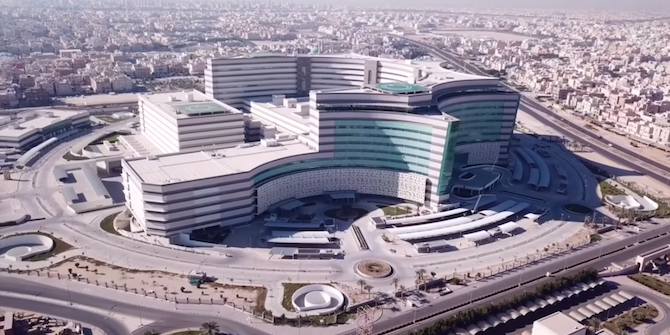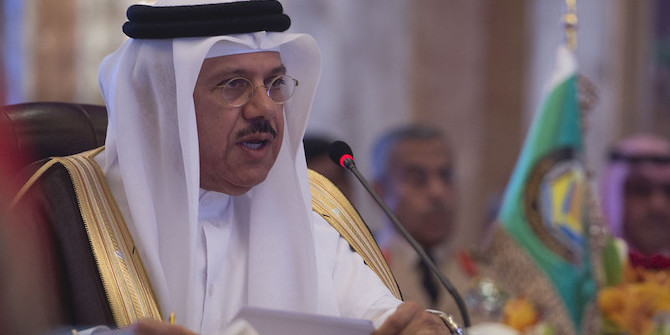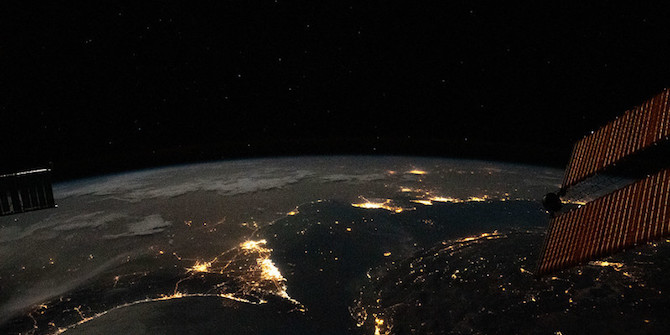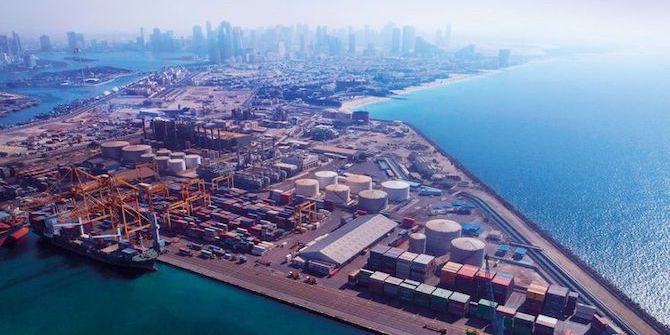by Jessica Watkins

I have recently returned from a research trip to Doha. I can’t say how the current mood compares to how things were before the Saudi-led blockade against it began last summer because this was my first visit there, but on balance, it seemed more resolute than broken.
My trip coincided with a piece in The Guardian by Tim Adams on how Qatar is turning the catastrophe of the blockade into a domestic opportunity. I know this not from reading The Guardian (or any other newspaper for that matter) but because Al-Jazeera Arabic – which I’ve been watching a great deal lately – highlighted the article in a news bulletin.
Al-Jazeera was in fact the main reason for my trip: as part of the Conflict Research Programme, this year I’m working on a project assessing the role that pan-Arab media channels including Al-Jazeera Arabic have played in portraying, exacerbating, or indeed alleviating sectarian tensions and violence during the Iraq and Syria wars. Al-Jazeera itself has been banned over the past few years by several countries across the region on the grounds that it incites religious hatred – a charge that may be valid, may be politically motivated, but in either case merits a thorough analysis.
It’s still early days in the research and I don’t want to foreshadow my findings (which will be published in about 8 months’ time) but in the context of the project, I went to quiz some of the Al-Jazeera staff as well as other media experts – of which there are many in Doha.
Al-Jazeera, funded by the Emir of Qatar, is at the centre of the Gulf Crisis: its closure was one of the 13 (extraordinary and rejected) demands that Saudi and its allies made on Qatar last June. And, while the other points on the list included cutting diplomatic and economic links with Iran, cutting contact with a number of designated ‘terrorist’ groups including the Muslim Brotherhood, and ceasing military cooperation with Turkey, somehow it is the demand for Al-Jazeera’s closure that seems to have garnered most international media attention.
The sense of indignation within Doha at this demand is palpable. Even some who have been otherwise critical of Al-Jazeera’s editorial stance on certain issues are protective of the channel, which has come to represent Qatari sovereignty. Several of my interviewees echoed what Sheikha Hind, the Emir’s sister, told The Guardian: ‘Imagine [another nation] telling Britain to close the BBC – you would be shocked.’ I did dutifully imagine Donald Trump making such a demand without too much difficulty. But the comparison doesn’t seem entirely fair: Al-Jazeera has been a protagonist in the Arab Spring and particularly the Syria war, not merely a witness. And, even if the editorial line is more a product of self-censorship than direct governmental control, Al-Jazeera has served as a tool of Qatari foreign policy. One journalist I spoke with ventured that ‘Qatar would be nothing without Al-Jazeera’.
The ultimatum may well have boosted viewership of Al-Jazeera, as well as of Al-Araby – another, smaller, state-sponsored Qatari TV outlet that was singled out for closure by Saudi and its allies. Viewership of any of the pan-Arab satellite channels is hard to gauge: regional governments heavily regulate attempts to poll viewership because of political sensitivities; respondents are afraid of telling the truth and are particularly unlikely to admit watching channels online which are banned in their country – as Al-Jazeera is in several.
In 2013, Al-Jazeera Arabic relied on combined IPSOS and Sigma polling to claim it had over 25 million viewers – more than all of its competitors combined. But the channel has, depending on how you look at it (and it is the purpose of my study to look at it more systematically than has been done so far), jumped or been dragged into political controversy related to its reporting of the conflicts in Egypt, Bahrain, Iraq and especially Syria. It is hard to believe that this has not taken a toll on its overall viewership.
22 years after it went on air, Al-Jazeera Arabic still identifies itself as offering a voice to the oppressed, championing ‘the Arab people’, and forging a voice from the Global South to the rest of the world. ‘If you don’t stand with the people, you can’t be a journalist’, one Al-Jazeera employee asserted. It is an attitude that Al-Jazeera staff can afford to have precisely because they focus on the people of region and do not cover the government of Qatar.
But the channel has moved from a position in the vanguard of the pan-Arab satellite news industry into the establishment. With this transition has come considerable academic attention. Before my arrival in Doha, the Jazeera Centre for Studies, an offshoot of the TV channel whose political scientists conduct their own independent academic research, sent me a compilation of over 200 abstracts from books, PhD theses, Masters dissertations and other studies conducted on Al-Jazeera between 1996 and 2012 alone. The Centre has apparently been allocated the onerous task of fielding the enquiries of visiting researchers such as myself, a task that its staff undertook most graciously.
At Al-Jazeera I found an intriguing mixture of disarming openness amongst staff I spoke with on an informal basis, with discernible constraints to ‘official’ access. I was left uncertain as to whether the constraints (revolving around repeated delays in obtaining a pass to access the building even after having pre-arranged to talk with several people) were bureaucratic, based on time constraints of journalists working in a fast-paced environment, or, given the nature of my enquiries, due to reluctance at a more senior level to entertain my questions.
‘Even the BBC requires you to have an access pass’, I was told. Ok, but is the route to getting it quite so circumventious? ‘Don’t expect the others [Arab media networks] to give you straight answers’, another cautioned. That may well be the case; over the coming months I intend to find out.
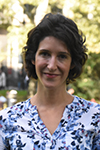 Jessica Watkins is Research Officer at the Middle East Centre, currently working on a DFID-funded project looking at regional drivers of conflict in Iraq and Syria. The project ties in with Jessica’s previous research at the RAND Corporation into Iraqi and regional security issues.
Jessica Watkins is Research Officer at the Middle East Centre, currently working on a DFID-funded project looking at regional drivers of conflict in Iraq and Syria. The project ties in with Jessica’s previous research at the RAND Corporation into Iraqi and regional security issues.



